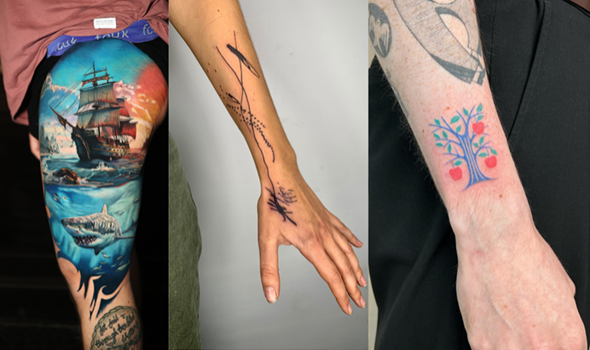Migrant tattooists make their mark
Migrant tattooists make their mark

Tattooists are not high on the list of migrants to the UK, but several have made their mark here.
“It opened many doors for me,” says Dean Gunther, a 36-year-old Manchester-based tattoo artist from Cape Town, South Africa, about his decision to move to the UK in 2017.
A self-taught artist, Gunther has been tattooing for more than 16 years. Since coming to the UK he has developed his style, using realistic elements in vivid colours, gaining international recognition.
In June 2024 he applied for British citizenship, which he describes as an expensive, lengthy process, though he emphasises, “I mean, I love the UK. it has good opportunities, you can make a decent living.”
A bonus of the new location, he says, is proximity to Europe: “There's conventions every weekend in different towns. And you can just fly half an hour and you're in a different country.”
Since his arrival he has stopped drinking, which he says was holding him back during his years tattooing in South Africa.
“All that attention that I'd put into drinking, all that time, I've put now into my work, into my art, and that really elevated me”, he says.
He sees himself staying in the UK.
But his connection to his homeland influences his work, and he often draws on his knowledge and memories of South African fauna when clients ask for nature-inspired designs.
“I know Cape Town; [the landscapes of] Table Mountain and Lion's Head and the proteas [a South Africa plant] like the back of my hand," he explains.
London-based Ann Chang, a 31-year-old tattoo artist from Taiwan, is also deeply influenced by where she grew up. Her tattoo pieces are “mostly about the scenery and plantations of Taiwan, where I came from. My mom has a beautiful garden that has a beautiful pond … and it rains a lot as well.”
For Chang, staying in the UK came with visa challenges.
She moved to the UK in 2016, initially with a Youth Mobility Visa. Two applications for a Global Talent Visa were rejected.
The Arts Council, responsible for endorsing artists applying for talent visas, does not recognise tattooing as an art form. Chang put on a traditional art exhibition, Temporary before permanent, which featured temporary stencils, placed on the body to guide the permanent tattoo. The show and the accompanying media coverage, helped meet the visa criteria, which was given in 2021.
Although a few tattoo studios are registered as able to sponsor workers, no visa is specifically designed for tattooists. An Arts Council England spokesperson explained, “We would not be able to consider an application from a practising tattoo artist that works in a studio tattooing their designs on people. This is not an area within our arts and culture remit, and there are health regulations, policies and licensing requirements to operate as a tattoo artist which are not within our scope.”
Like memories of hometown scenery, the tattoo chair can be an intimate space: clients share personal stories while artists work on permanent alterations to their bodies.
“It’s like a memento,” says Chang. While she may not remember the face of a client if they meet on a pavement, she’ll instantly remember their story once she sees the art on their body.
Similarly, this feeling of proximity motivated Gunther to create a podcast that he records while tattooing.
“I find it quite easy to speak to people from all backgrounds,” he explains. He mentions a magician, ex-prisoners, and a bare-knuckle fighter.
For Oksana Demidova, 28, it’s the personal connection that makes each session different. “Sometimes it gets a bit repetitive, just technical work, right? Because the process is kind of the same thing, if you think about it.”
Originally from Ukraine, Demidova lived in Berlin for two years before coming to London, because it felt like “the right next step”, five days after the outbreak of the war with Russia.
“When you connect on something like art, it's a feeling that you share, that you both can relate to in some way … it makes me really want to get to know [clients] better, to understand what we have in common — and there's always something. That's the most exciting part of every session,” she explains.
Working with linocut techniques that use carved linoleum blocks and ink to print on paper, she creates intricate designs that are then recreated on skin. Demidova says that her early career in Kyiv as a printmaker was formative. The Kyiv art scene, she says, “gets very experimental. You didn't have anyone to tell you how to do it. So people just go in really interesting, different ways.”
“People are multifaceted," as Demidova put it when talking about clients. “I've tattooed lawyers, software engineers, a quantum physicist. And they're all very creative themselves. I guess people narrow what people are like, because we can't really imagine how one person could do so many things.”
Art and creativity transcend borders or visa status, and tattoos can serve as a permanent reminder on someone’s body – regardless of where they’re from – that human connection can be rich, complex and often unexpected.
Photo credit (from left to right): Dean Gunther, Oksana Demidova, Ann Chung


